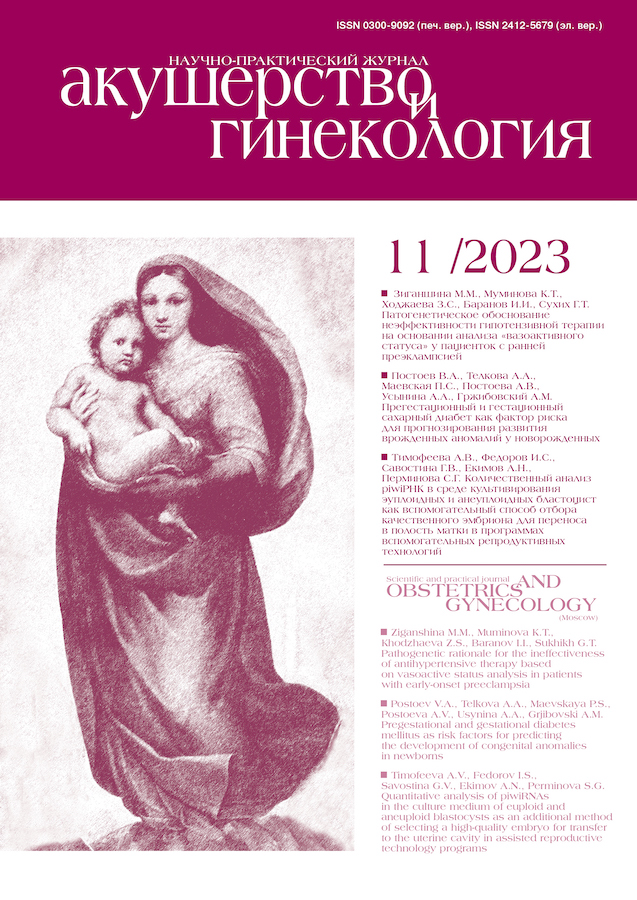Molecular genetic markers in the pathogenesis of fetal growth retardation
- Autores: Tyutyunnik V.L.1, Kan N.E.1, Volochaeva M.V.1, Borisova A.G.1, Gasymova S.R.1
-
Afiliações:
- Academician V.I. Kulakov National Medical Research Centre for Obstetrics, Gynecology and Perinatology, Ministry of Health of Russia
- Edição: Nº 11 (2023)
- Páginas: 20-26
- Seção: Reviews
- ##submission.datePublished##: 30.11.2023
- URL: https://journals.eco-vector.com/0300-9092/article/view/626052
- ID: 626052
Citar
Texto integral
Resumo
The article presents the analysis of the data of modern literature on the actual aspects of fetal growth retardation (FGR) verification in terms of molecular genetic diagnostic methods. The review includes the data of foreign and Russian scientists published in PubMed and eLibrary. The problem of the FGR diagnosis remains relevant, despite the “golden standard” of diagnosis meeting the criteria adopted by the international consensus of Delphi which was introduced into the practice of obstetricians, gynecologists and ultrasound specialists. The article presents the results of the analysis of the literature data on the role of molecular genetic markers in the FGR pathogenesis, various mechanisms of the FGR development in terms of genomics, transcriptomics, as well as the analysis of their combination with the factors of the hemostasis system. Special attention is paid to the mechanisms of the FGR development due to the changes in immune processes, inflammatory reactions, as well as the changes in the processes of angiogenesis in the placenta. This study also examines the possibility of diagnosing a fetus with FGR using the assessment of the level of extracellular fetal DNA, the processes of methylation of genes-regulators of metabolic pathways and a number of immune processes. The literature data on the epigenetic regulation of gene expression in FGR are of particular interest; microRNAs isolated from the placenta and circulating in the blood of pregnant women are studied. The search for specific minimally invasive markers currently continues as they have already allowed the clinicians to improve the existing criteria for diagnosis.
Texto integral
Sobre autores
Victor Tyutyunnik
Academician V.I. Kulakov National Medical Research Centre for Obstetrics, Gynecology and Perinatology, Ministry of Health of Russia
Email: tioutiounnik@mail.ru
ORCID ID: 0000-0002-5830-5099
Código SPIN: 1963-1359
Scopus Author ID: 213217
Researcher ID: B-2364-2015
Professor, MD, PhD, Leading Researcher of the Center for Scientific and Clinical Research
Rússia, 117997, Moscow, Ac. Oparina str., 4Natalia Kan
Academician V.I. Kulakov National Medical Research Centre for Obstetrics, Gynecology and Perinatology, Ministry of Health of Russia
Email: kan-med@mail.ru
ORCID ID: 0000-0001-5087-5946
Código SPIN: 5378-8437
Scopus Author ID: 57008835600
Researcher ID: B-2370-2015
Professor, MD, PhD, Deputy Director of Science
Rússia, 117997, Moscow, Ac. Oparina str., 4Maria Volochaeva
Academician V.I. Kulakov National Medical Research Centre for Obstetrics, Gynecology and Perinatology, Ministry of Health of Russia
Email: volochaeva.m@yandex.ru
ORCID ID: 0000-0001-8953-7952
PhD, Senior Researcher, Department of Regional Cooperation and Integration, Physician at the 1 Maternity Department
Rússia, 117997, Moscow, Ac. Oparina str., 4Anastasia Borisova
Academician V.I. Kulakov National Medical Research Centre for Obstetrics, Gynecology and Perinatology, Ministry of Health of Russia
Email: vvv92@list.ru
ORCID ID: 0009-0004-52341584
postgraduate student
Rússia, 117997, Moscow, Ac. Oparina str., 4Shagane Gasymova
Academician V.I. Kulakov National Medical Research Centre for Obstetrics, Gynecology and Perinatology, Ministry of Health of Russia
Autor responsável pela correspondência
Email: shagane2501@mail.ru
ORCID ID: 0009-0001-2626-6670
Junior Researcher, Department of Fetal Medicine, Institute Of Obstetrics, ultrasound diagnostics doctor, Department of Ultrasound and Functional Diagnostics, obstetrician-gynecologist
Rússia, 117997, Moscow, Ac. Oparina str., 4Bibliografia
Arquivos suplementares








